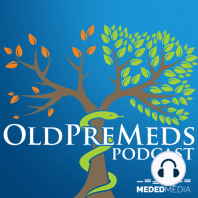10 min listen

178: Should You Put Global Health Experience On Your Application?
178: Should You Put Global Health Experience On Your Application?
ratings:
Length:
12 minutes
Released:
May 15, 2019
Format:
Podcast episode
Description
v Session 178 Your questions are taken directly from the Nontrad Premed Forum. Be sure to register for an account if you haven't yet, and join a collaborative community of like-minded students. This week, we tackle a question about global health and volunteering abroad. Meanwhile, be sure to check out all our other resources on the Meded Media along with a host of podcasts to help you along your path. [00:52] OldPreMeds Question of the Week "I am hoping to get feedback about whether I should put my global health experience on my med school application or not. I have what I feel is great global health experience. However, I have been getting more and more concerning feedback on what that experience will look like on my med school application. Recently, my adviser at school told me that the experience does not count as healthcare experience, it only counts as a cultural experience. Additionally, I have heard that some med schools are starting to reject applications with any global health experience at all to discourage students from doing short term medical “missions” that can be damaging to local communities. Lastly, I had posted something in the Premed Hangout Facebook group about my experience and how much I enjoyed being in the OR shadowing cataract surgeries. I posted a picture of myself with one of the ophthalmic nurses I had become friends with over the duration of my experience. I was really surprised by the amount of negative feedback I got from the Facebook group. People began privately messaging me and commenting that what I did was unethical, I didn’t deserve to get into medical school, and making comments that it looked really bad for a white woman to go to a third world country to participate in one of these programs that takes advantage of under-served and under-represented populations. I ended up deleting the post and leaving the Facebook group. It was really disheartening because I had put a lot of research into making sure I chose a program that really emphasized responsible global health practices that provide long term and follow up care to patients. I am now very concerned about the experience of having a really negative impact on my application. I have several years of experience working as an optometric technician and grew very passionate about eye care. One day at work, a pharmaceutical rep told me about her experience volunteering abroad on an eye care trip and I thought it sounded like a great opportunity to give back to the world for something I was passionate about. I began researching programs and learned about the differences between doing a program that focuses on providing sustainable global health and doing a short term eye care “mission” trip. After understanding that the short term trips, even if well-intended, can actually have a really negative impact on the communities they are trying to help, I found a really great program called Unite For Sight. Unite For Sight partners with local native ophthalmologists in Ghana, India, and Honduras to provide them with funding to run outreach programs through their private clinics. With the funding from Unite For Sight, these private clinics are able to hire a local outreach team. The outreach team has a designated region. And each day, they travel 1-4 hours to different outreach locations to provide eye screenings by local optometrists and ophthalmic nurses hired for the outreach program. They are then able to dispense reading glasses and medications for conditions like glaucoma etc. When a patient needs surgical treatment for something like cataracts or glaucoma, arrangements are then made to transport the patient to the main clinic for further testing or treatment. The patient usually stays near the clinic for a few days for follow up care and then the ophthalmologist will travel to designated areas to provide further follow up post-op care around the 3, 6. and 12-week mark. At the last post op, once everything is healed, they are given a new glasse
Released:
May 15, 2019
Format:
Podcast episode
Titles in the series (100)
6: How to get the Best Letters of Recommendation as a Nontrad: Session 6 Ryan and Rich answer your questions over at the OldPreMeds.orghere on the OldPreMeds Podcast. In today's episode, they will touch on letters of recommendation - what the admissions committee is looking for, how to get strong ones, and when... by OldPreMeds Podcast